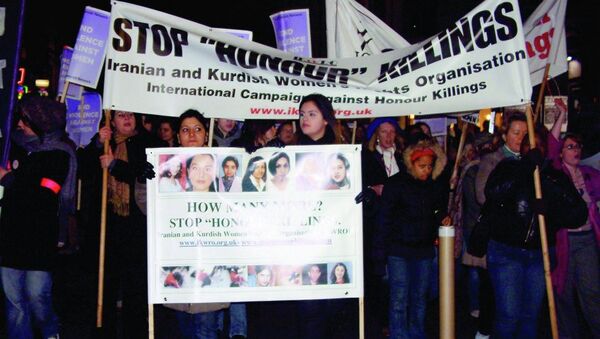Women can become targets of ‘honour’ based violence for choosing their own husband, leaving an arranged marriage, becoming the subject of gossip or becoming ‘Westernised’. The consequences are rape or other forms of violence; kidnap, acid attacks, forcing marriage and disownment.
A new report, ‘Honour’ Killings in the UK by think tank, Henry Jackson Society, reveals that many young women fleeing their fate are at further risk of being killed by being sent home. Its report found officials are failing to recognise the threats and consequences of honour based violence and are returning victims to their families.
“There is no other circumstance where a victim is sent back to their perpetrator”, says Mandy Sanghara, a human rights campaigner and government advisor on forced marriage. “Why do we return victims of ‘honour’ based violence?”
Protection not Political Correctness
Sexual and physical abuse of women in ethnic faith based communities is under-reported in Britain. The culture of honour and shame is so powerful it stops victims from speaking out. Leaving them more vulnerable to abuse.
Fears that offending Britain’s diverse communities have been prioritised over the safety of women and girls. Consequently, forced marriages, and ‘honour’ based violent crimes remain hidden within Britain’s multicultural society.
Mandy Sanghara told Sputnik UK:
“‘Honour’ based violence remains hidden and underreported in Britain. Forcing someone into a marriage against their will is not a religious practice, it is a cultural practice, and professionals need to be aware of the difference between religious and cultural practices.
“This is an issue about protection, not political correctness”.
No ‘Honour’ in Arranged Marriages
Amy Kaur from the West Midlands grew up in a strict Indian family in England where she was forced into an arranged marriage at 21.
Amy was physically and sexually abused and beaten by her husband on many occasions. The marriage finished when her husband left her after trying to frame her for attempted murder. “It was called an arranged marriage — but I had no choice when my parents said yes to him — I had to agree. I was too scared to say no.
“There’s no ‘honour’ in arranged marriages”.
Amy’s parents forced her to marry again. When Amy was raped she turned to her family for help. But instead of helping her, Amy told Sputnik UK, that her family disowned her. “I was sexually abused and raped twice in my life. I didn’t tell anyone the first time; the second time when I did reveal my ordeal, my family disowned me.
“They didn’t want to hear my story – they chose to believe someone else instead. You just feel dirty, shame at how strangers can be believed over you. You get called every name under the sun”.
In 2013, the government’s Forced Marriage Unit dealt with 1,302 cases. Women from South East Asian backgrounds made up for 63% of all reported cases. 48% were aged between 18 and 25. Pakistan and Bangladesh were the most common countries where victims of forced marriages were sent to: 42.7% and 10.9% respectively.
Forced marriage became a criminal offence in England and Wales in June 2014. The legislation also applies to British citizens overseas who are at risk of being forced to marry someone against their will. The maximum penalty for the offence is seven years in jail.
#SREnow We need to be telling kids about '#honour' #violence, #forcedmarriage and #fgm before they happen @IKWRO #righttoknow
— Joanne Payton (@GalloiseBlonde) December 18, 2014
The new criminal offence works in conjunction with the existing Forced Marriage Protection Orders, which allow victims to choose between a civil or criminal option to pursue perpetrators.
However police forces across the country are failing to record ‘honour’ based violent crimes making it difficult to ascertain how many forced marriages are taking place. The highest number of ‘honour’ based violence cases are in London followed by the West Midlands, West Yorkshire, Lancashire and Manchester.
In 2011, the Iranian and Kurdish Women’s Rights Organisation sent Freedom of Information requests to all 52 police forces in the UK asking how many incidents of ‘honour’ based violence they had recorded. Only 39 forces responded with a total of 2823 incidents.
The new report published by the Henry Jackson Society says it’s not known exactly how many ‘honour’ killings occur in Britain each year. According to its database, 29 murders or attempted murders were reported in the media in the last five years.
Although it’s feared that the true figure is much higher; it’s estimated 12 ‘honour’ killings take place in the UK every year.




